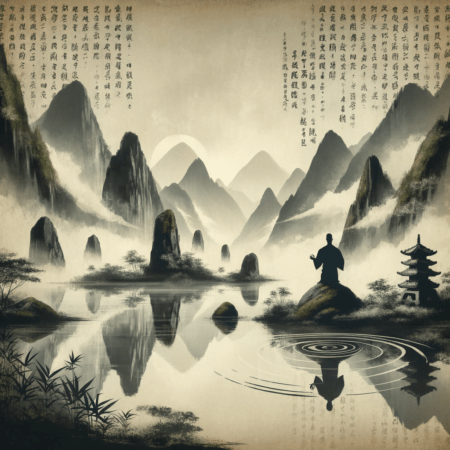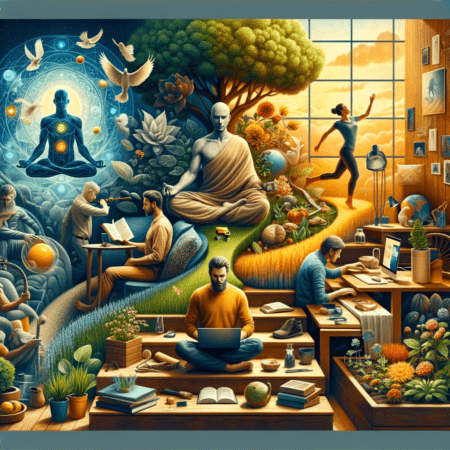As I approach my 35th birthday, I’m reminded that the pursuit of a good life is a lifelong journey, not a destination. Despite the progress I’ve made and the clarity I’ve gained through running this blog, I’m still grappling with more questions and doubts than I’d like to admit. It’s a paradox – the more I learn, the more I realize how much I still have to learn. Regardless of the uncertainty, one thing remains clear: my unwavering desire for freedom and to live a better life. The freedom to choose, to be responsible for my life, and to live on my own terms. This is the prime driver behind my every decision, and I believe it’s the key to unlocking a truly fulfilling existence.

As I reflect on my journey so far, I’m drawn to a fundamental question: what does it take to live a good life? Is it a matter of checking off a series of boxes, or is it something more nuanced?
I’ve come to realize that it’s not about having all the answers, but about identifying the essential areas to focus on. And that’s where my deterministic perspective comes in – I believe that once you understand the pillars that contribute to the attainment of freedom, the rest will follow naturally as a consequence of becoming proficient in those areas.
In this article, I’ll explore the essential pillars of freedom in the modern world, and what it takes to live a life that’s true to who you are. This is not a prescription for success, but rather a roadmap for those who, like me, are driven by the desire to live life on their own terms.
Standing on Shoulder of Giants: Philosophical Perspectives on a Good Life
The quest to understand how to live a good life has captivated philosophers across cultures and eras. As deep as this rabbit hole is, let’s not get sidetracked too far and only mention a few of the most interesting ideas.
Ancient Greek Wisdom
In ancient Greece, a battle between Hedone (ἡδονή), the pursuit of pleasure and enjoyment versus Eudemonia (εὐδαιμονία) living a life of purpose, fulfillment, and contentment, has emerged. Yet the teachings of Aristotle, one of the most influential philosophers of antiquity, brought us a more holistic framework for achieving a fulfilled life.
Aristotle’s concept of Telos (τέλος) – the ultimate purpose of human existence – posits that true happiness and well-being (Eudemonia) can only be attained through the cultivation of virtues (Arete) like courage, temperance, justice, and wisdom. For Aristotle, living well was about striving to reach our full potential as rational, social beings, not merely maximizing pleasure. His ideas on cultivating good character, finding meaning through civic engagement, and balancing moderation with passion, remain remarkably relevant to our modern pursuit of the good life.
Embracing the Eastern Perspective

On the other hand, eastern philosophies share a distinct emphasis on harmony, balance, and acceptance in the middle of the ever-changing nature of existence.
Buddhism advocates letting go of cravings and aversions through practices like meditation to cultivate inner peace and compassion for all beings. While this can bring individual serenity, the core purpose is reducing suffering in the world.
Confucianism stresses, on the other hand, cultivating virtues like benevolence, righteousness, and filial piety (respect, obedience, and care towards ancestors) to maintain harmonious relationships and societal order.
Daoism teaches realigning oneself with the natural flow of the Dao or “Way” – the inexpressible source and principle underlying the universe. This means acting with humility, simplicity, and spontaneity rather than against the organic patterns of life. The path is not always a straight line, but a winding process of appreciating the ebbs, flows, and inevitable cycles of existence.
While religions later co-opted some of these ideas, separating self from religious dogma was a cornerstone of Enlightenment thinkers and our modern views.
Modern Times Philosophies
By the 20th century, we had progressed in our philosophical debates, classifying them into distinct academic disciplines. The ideas from earlier eras paved the way for a more rationalistic, scientific study of human behavior and flourishing – a quest to better understand the meaning of life. Humanistic psychologists, like Abraham Maslow, explored intrinsic human motives and self-actualization beyond base needs. Initially, early psychology still focused heavily on pathology and disorder, rather than wellbeing per se.
It wasn’t until the late 20th century that positive psychology emerged, aiming to empirically study the factors allowing individuals and communities to thrive. Positive psychology synthesizes ancient wisdom about virtue, meaning, and well-being with modern research into practices like gratitude, mindfulness, resilience, and cultivating strong social connections. While drawing guidance from philosophical and spiritual traditions across cultures, its evidence-based approach rigorously tests which skills and interventions can measurably improve life satisfaction, productivity, and human potential.
Today, this multifaceted exploration of human flourishing continues, as we strive to understand the complex interplay of factors that allow us to truly live well.
Essential Pillars of Freedom
The journey towards living well is multifaceted, requiring intentional effort across several interrelated domains. As the cliché goes, “What gets measured gets managed” – by bringing conscious awareness to key areas of life, we can harness our focus to catalyze growth and achievement.

Career/Professional Life: Finding fulfillment through our work is crucial. This means aligning our daily efforts with a sense of purpose, continually developing valuable skills, and striving for mastery in our chosen fields. A rewarding career provides meaning and financial sustainability, whether working for someone else, running a small business, or leading a large organization.
Financial Freedom: While money alone doesn’t bring happiness, financial discipline allows us to meet our basic needs, pursue growth opportunities, support loved ones, and have a safety net for uncertainties. Budgeting, saving, investing wisely, and generating income from our passion, projects, or investments all contribute to this pillar. With financial strength, we can expand our choices and turn many problems into mere expenses.
Personal Development: We must continually invest in our own mental, intellectual, physical, and emotional evolution. This comes through educating ourselves, building good habits, enhancing strengths, confronting flaws, and always preserving a beginner’s mind of humility and curiosity.
Wellbeing: Experiencing authentic wellbeing requires holistically nurturing our mind, body, and spirit. Practices like meditation, exercise, nutrition, adequate sleep, creative expression, and connecting with nature replenish us.
Community And Relationships: As social beings, we need quality relationships to thrive. Investing in a circle of love, trust, mutual understanding, and respect with partners, family, friends, and communities is vital.
Spiritual Exploration: Whether through religion, philosophy, contact with nature, or honest inquiry into questions of consciousness and our place in the cosmos. A spiritual dimension provides wisdom, comfort, and inspiration for the human journey allowing us to reflect and transcendent our daily hurdles.
These fields overlap and do not exist one without the other – we don’t live in a vacuum. Yet in the modern world, I believe we need to become a Renaissance-like individual, being multi-skilled and maintaining a broad perspective across various areas. This foundational understanding will enable us to utilize tools and other experts to accelerate our growth and attainment of freedom.
The goal is not to become the new Buddha or to focus solely on a single pursuit, such as sports or money. Instead, I believe each of these areas has its place, and they need to be in synchronicity to attain freedom and a fulfilled life.
Cultivating the Foundations for Fulfillment

By purposefully tending to these interconnected pillars of life, we create the fertile soil for our dreams to blossom into reality through steady action and perseverance. The path is never linear, but by focusing our energy diligently in the right places, we can make a profound difference.
Whether we draw inspiration from Eastern wisdom traditions or the empirical findings of modern positive psychology, the underlying aim is to live an ethical, fulfilling life in harmony with ourselves, others, and the cosmos. I firmly believe that by pursuing all of these pillars, regardless of our philosophical or religious leanings, we can fully blossom and excel in our journey towards fulfillment and freedom.
So, what ideas, dreams, and goals would you like to set for yourself?

